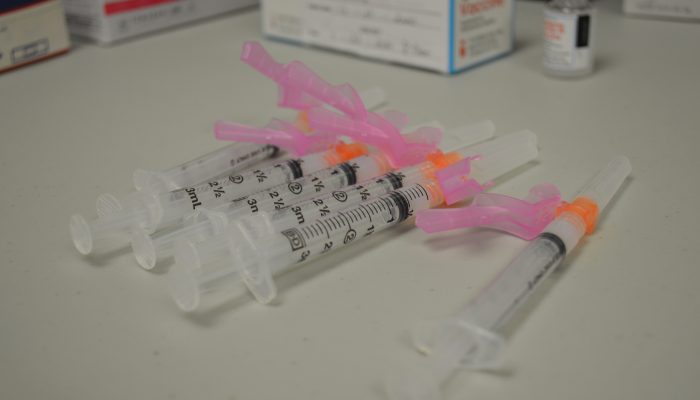UPDATE: The U.S. CDC has ended the “pause” on Johnson & Johnson COVID-19 vaccine as of Friday, April 23, 2021. After reviewing the evidence they found that the risk of the clotting issue to be extremely rare. This vaccine is an effective way to prevent the spread of COVID-19 and is recommended, both by the Health Department and CDC. The newly updated Fact Sheet for Recipients and Caregivers can be found on the FDA’s website.
The Philadelphia Department of Public Health has paused the use of the Johnson & Johnson vaccine following a statement from the U.S. FDA regarding rare instances of blood clotting after receiving the Johnson & Johnson COVID-19 vaccine. The City and all partner clinics will not provide this vaccine until receiving further guidance.
People who have received the J&J vaccine, and who develop severe headache, abdominal pain, leg pain, or shortness of breath within three weeks after vaccination, should immediately contact their health care provider.
About the Johnson & Johnson vaccine
Across the country, nearly 7 million doses of J&J vaccine have been administered and six cases of what is called “cerebral venous sinus thrombosis” was seen in combination with low levels of blood platelets. This reaction is what prompted the CDC and FDA to pause administration of the J&J vaccine.
In Philadelphia, 20,622 doses of J&J vaccine have been administered and no cases of this clotting issue have been identified.
About the Pfizer and Moderna vaccines
More than 182,000,000 doses of Pfizer and Moderna vaccine have been administered across the United States and surveillance systems have not found any evidence of these types of clotting issues.
In Philadelphia, 969,729 doses of Pfizer and Moderna vaccines have been administered and no cases of this clotting issue have been identified.
The Health Department strongly believes that the Pfizer and Moderna vaccine are safe and effective. The Pfizer and Moderna vaccines are fundamentally different vaccines that work differently than J&J and should not have this problem.
What does this mean for COVID-19 vaccine clinics?
Center City Vaccination Center (FEMA-supported clinic at the Pennsylvania Convention Center)
Will be open today, April 13, at noon and administer the Pfizer vaccine. The clinic will continue with the Pfizer vaccine for the foreseeable future and will maintain the current 6,000 appointments and walk-ups per day.
Esperanza Community Vaccination Center (FEMA-supported clinic at Esperanza)
Will be closed today, April 13. Beginning tomorrow, April 14, the clinic will switch to Pfizer vaccine and will maintain the current 1,000 appointments and walk-ups per day.
Health Department Community Clinics and Health Centers
Will be open with normal hours and operations, but will not use J&J vaccine.
Philadelphia Fire Department Community Clinics
Will be closed until at least Monday, April 19.
Health Department and Partner Mobile Teams
Will continue operating, but will not use J&J vaccine.
Partner Vaccine Clinics (including Black Doctor’s COVID-19 Consortium, federally qualified health centers, independent and chain pharmacies, hospitals, etc.)
These clinics will move to Pfizer or Moderna vaccine if they are using J&J vaccine. If they are unable to use Pfizer or Moderna vaccine, they may close. Please call ahead if you have an appointment scheduled with them.
FAQ on the pause of Johnson & Johnson vaccine
- What happened? Why is the J&J vaccine being paused?
- 8 million doses of J&J vaccine have been administered in the U.S. and 6 people who received the vaccine developed a rare type of blood clot called cerebral venous sinus thrombosis, which requires special treatment.
- The CDC and FDA are reviewing the these 6 cases to see if they may be connected to the J&J vaccine. Until that process is complete, PDPH is recommending a pause in the use of this vaccine out of an abundance of caution.
- How many people in Philadelphia have received the J&J vaccine and how many have had complications?
- 20,622 doses of J&J vaccine have been administered in Philadelphia and zero cases of this clotting issue have been identified.
- How does the CDC find out about complications?
- Health care providers are asked to report any adverse events to the Vaccine Adverse Event Reporting System at https://vaers.hhs.gov/reportevent.html
- I received a J&J vaccine, should I be worried and what should I do?
- People who have received the J&J vaccine, and who develop severe headache, abdominal pain, leg pain, or shortness of breath within three weeks after vaccination, should immediately contact their health care provider.
- Be reassured that you made the right choice to be vaccinated. The possibility of complications from the COVID-19 infection are much higher than the possibility of complications from the J&J vaccine.
- I received a J&J vaccine, how likely is it that I will develop this type of blood clot?
- It is extremely rare. You have a greater chance of being struck by lightning than of having any complications from the J&J vaccine.
- 8 million doses of J&J vaccine were given in the U.S. and 6 people developed potential complications. This is a one in a million possibility, which is extremely rare.
- Why is PDPH “pausing” the use of J&J vaccine and not “stopping” its use?
- Because the 6 people who developed blood clots are all women under the age of 50, the CDC and FDA may determine that the J&J vaccine is safe for certain groups of people, after carefully reviewing all the evidence.
- Until the evidence can be reviewed PDPH, all vaccine providers and partner clinics will not provide J&J vaccine until receiving further guidance.
- Are the Pfizer and Moderna vaccine still safe?
- Yes, the Pfizer and Moderna vaccines use different technology than J&J and should not have this problem.
- More than 182,000,000 doses of Pfizer and Moderna have been administered in the US and surveillance systems have not found any evidence of these types of clotting issues.
- In Philadelphia, 969,729 doses of Pfizer and Moderna vaccines have been administered and no cases of this clotting issue have been identified.
- The Health Department strongly believes that the Pfizer and Moderna vaccine are safe and effective.




